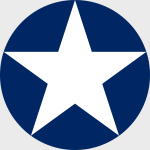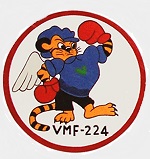DeAgostini DAWF18 USMC Grumman F4F-3 Wildcat Fighter - Major Robert E. Galer, VMF-224 "Fighting Bengals", Guadalcanal, 1942 [With Collector Magazine] (1:72 Scale)
"Skipper, it really worked. I couldn't make any attack without seeing the nose of one of your airplanes pointed at me."
- Ensign Edward "Butch" O'Hare discussing the newly-developed "Thach Weave" maneuver with Lt. Commander John Thach
 The Grumman F4F Wildcat was the standard carrier-based fighter of the United States Navy for the first year and a half of World War II. An improved version built by General Motors (the General Motors FM Wildcat) remained in service throughout the war, on escort carriers where newer, larger and heavier fighters could not be used.
The Grumman F4F Wildcat was the standard carrier-based fighter of the United States Navy for the first year and a half of World War II. An improved version built by General Motors (the General Motors FM Wildcat) remained in service throughout the war, on escort carriers where newer, larger and heavier fighters could not be used.
The Wildcat was outperformed by the Mitsubishi Zero, its major opponent in the Pacific war, but held its own by absorbing far more damage and wielding more firepower. With heavy armor and self-sealing fuel tanks, the Grumman airframe could survive far more than its lightweight, unarmored Japanese rival.
The original Grumman F4F-1 design was a biplane, which when proving inferior to rival designs was recast as the monoplane F4F-2. This was still not competitive with the Brewster F2A Buffalo which won initial US Navy orders, but when the F4F was fitted with a more powerful engine, the Pratt & Whitney Twin Wasp, it showed its true merits and became the F4F-3. US Navy orders followed as did some (with Wright Cyclone engines) from France; these ended up with the Royal Navy's Fleet Air Arm after the fall of France. In British service initially these were known as the Martlet I, but not all Martlets would be to the exact same specifications as US Navy aircraft. The F4F-3A would enter service as the Martlet III(B), the FM-1 as the Martlet V, and the FM-2 as the Martlet VI. The name Wildcat was still commonly used for these aircraft in spite of the official name change.
A new version, the F4F-4, entered service in 1942 with six guns and folding wings, allowing more to be crammed on a carrier; this was the definitive version and the one that saw the most combat service in the early war years including the Battle of Midway.
Grumman production ceased in early 1943 to make way for the newer F6F Hellcat, but General Motors continued producing them for both US Navy and Fleet Air Arm use, as larger fighters such as the Hellcat and the Vought F4U Corsair were too large for use on escort carriers. At first they produced the identical FM-1 model but then switched to the improved FM-2 (based on Grumman's F4F-8 prototype) with a more powerful engine and a taller tail to cope with the torque. In all, 7,251 Wildcats were built.
All versions of the Wildcat used hand-cranked landing gear with a relatively narrow track, making landing accidents where the landing gear were not fully locked into place distressingly common.
Pictured here is a 1:72 scale USMC Grumman F4F-4 Wildcat fighter that was piloted by Major Robert E. Galer who was attached to VMF-224 "Fighting Bengals", then deployed to Guadalcanal during 1942.
Now in stock!
Dimensions:
Wingspan: 9-1/2-inches
Length: 7-1/4-inches
Release Date: February 2021
 Historical Account: "Cactus Air Force" - Cactus Air Force refers to the ensemble of Allied air power assigned to the island of Guadalcanal from August 1942 until December 1942 during the early stages of the Guadalcanal Campaign, particularly those operating from Henderson Field. After December, the official name of the unit became Aircraft, Solomons (AirSols), but Cactus Air Force was still used frequently to refer to the organization. The term "Cactus" comes from the Allied code name for the island. In April 1943, the organization was redesignated as AirSols.
Historical Account: "Cactus Air Force" - Cactus Air Force refers to the ensemble of Allied air power assigned to the island of Guadalcanal from August 1942 until December 1942 during the early stages of the Guadalcanal Campaign, particularly those operating from Henderson Field. After December, the official name of the unit became Aircraft, Solomons (AirSols), but Cactus Air Force was still used frequently to refer to the organization. The term "Cactus" comes from the Allied code name for the island. In April 1943, the organization was redesignated as AirSols.
Marine Fighter Squadron 224 (VMF-224) was commissioned on May 1st, 1942, at Naval Air Station Barbers Point, Hawaii. Flying Grumman F4F Wildcats, the Bengals entered World War II as part of the Cactus Air Force stationed on Henderson Field, Guadalcanal. Led by Medal of Honor recipient Maj Robert Galer, the squadron accounted for over sixty Japanese aircraft being destroyed in less than two months. The squadron also conducted close air support (CAS) missions while under constant attack from Japanese naval, air, and ground forces. VMF-224's contributed significantly to the American victory during the Guadalcanal Campaign, which in turn, helped stem the tide of the Japanese advance across the Southern Pacific and secured a crucial foothold in the long island-hopping campaign against Japan.
After Guadalcanal, the squadron was refitted with the Vought F4U Corsair and participated in the Marshall Islands Campaign. The spring of 1945 found VMF-224 participating in the last great battle of the Pacific Campaign. During the Battle of Okinawa the squadron operated initially from Yomitan and then from Chimu Airfield from July 1st onward. Throughout the struggle for Okinawa, the Bengals flew infantry support and counter air missions accounting for an additional fifty-five enemy aircraft being destroyed.






